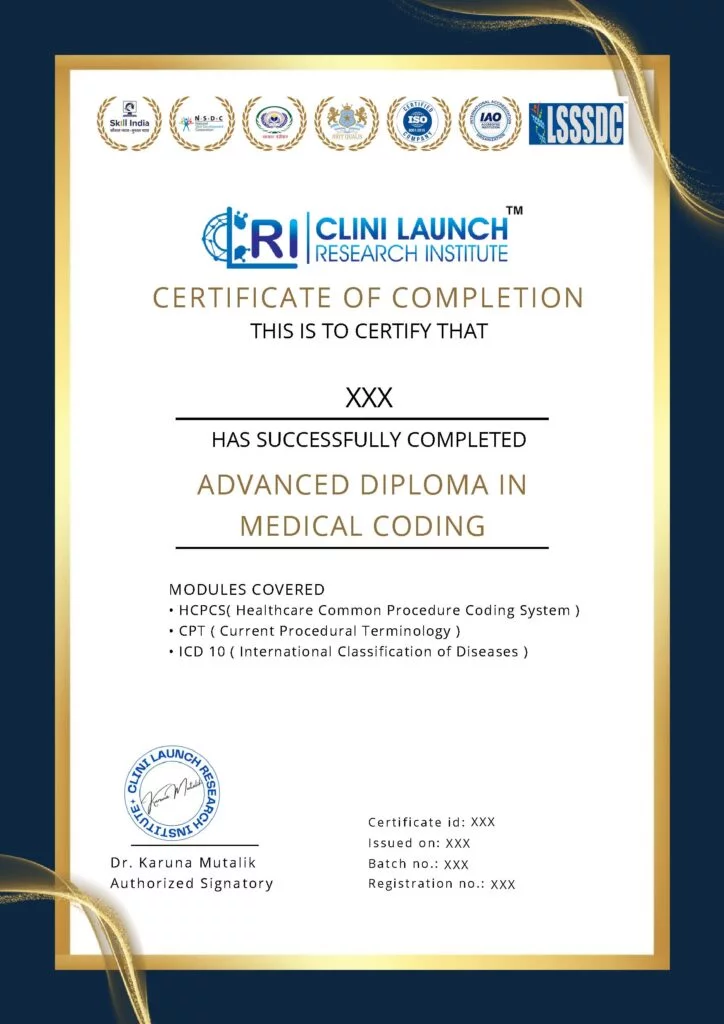Medical Coding Course in Bangalore
- 100% Placement Assistance
- Comprehensive Curriculum
- Hand-on Practical Training
- Online or Offline Sessions
Get ready to prepare for the Certified Professional Coder (CPC) exam, opening doors to vital healthcare administration.
Book Your Free Demo Class Today!
Medical Coding Course in Bangalore
Learn to translate healthcare diagnoses, procedures, and services into standardized alphanumeric codes. These codes are vital for accurate medical billing, processing insurance claims, analyzing health data, and maintaining precise patient records through medical coding courses. This training prepares you for a career in various healthcare environments, ensuring efficient and correct communication within the medical and insurance industries.
- 100% Placement Assistance
- Comprehensive Curriculum
- Hand-on Practical Training
- Online or Offline Sessions
Get ready to prepare for the Certified Professional Coder (CPC) exam, opening doors to vital healthcare administration.
Book Your Free Demo Class Today!

IAO & NSDC Accredited Courses

IAO & NSDC Accredited Courses

IAO & NSDC Accredited Courses

IAO & NSDC Accredited Courses
Why do medical coding course in Bangalore?
Pursuing a medical coding course in Bangalore offers a promising career path due to the city’s burgeoning healthcare IT sector and a high demand for skilled medical coders. Bangalore, as a tech and healthcare hub, provides access to numerous training institutes offering industry-aligned curricula, often with placement assistance, preparing individuals for lucrative roles in hospitals, clinics, and insurance companies that require accurate and compliant medical data management.
Globally Accredited Courses
100% Placement Assistance
Highly Qualified Trainers
Job Oriented Programs
Our Courses

Certification in Medical Coding
Be prepared to become a Certified Medical Coder. Learn how to use coding manuals by understanding anatomy, medical terminology, and physiology.
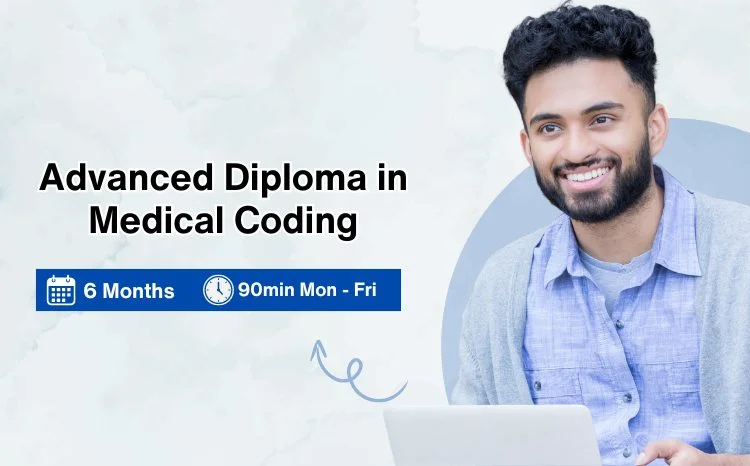
Advanced Diploma in Medical Coding
Learn to transform your vital healthcare data into documents including diagnosis, procedures, services & equipment into universal alphanumeric codes.
Career Paths after Medical Coding Course
Medical Coder
Certified Professional Coder
A Certified Professional Coder (CPC) is a healthcare professional who has passed a certification exam that shows their skills with medical coding training demonstrating their knowledge in CPC Exam.
Coding Specialist
Clinical Informatics
Clinical Informatics is the use of information technology in healthcare to improve patient care. It involves analysis, design and evaluation of information system to improve patient outcomes, increase access to care, advance medical research, and strengthen the clinician-patient relationship.
Billing Analyst
A billing analyst works in a company’s accounting department to ensure that clients are billed correctly. With billing and coding online, healthcare professionals manage accounts receivable, issue invoices, and oversee revenue intake.
Medical Records Clerk
Career Paths after Medical Coding Course
Medical Coder
Medical coding involves a health information professional who translates patient information into medical codes. They use codes that are used for billing and record-keeping by healthcare providers and insurance companies.
Certified Professional Coder
A Certified Professional Coder (CPC) is a healthcare professional who has passed a certification exam that shows their skills with medical coding training demonstrating their knowledge in CPC Exam.
Coding Specialist
Coding specialist is a healthcare professional who converts patient information into universal medical codes. They specifically work in hospitals, clinics, and doctors’ office to ensure the healthcare providers receives reimbursement for their services.
Clinical Informatics
Clinical Informatics is the use of information technology in healthcare to improve patient care. It involves analysis, design and evaluation of information system to improve patient outcomes, increase access to care, advance medical research, and strengthen the clinician-patient relationship.
Billing Analyst
A billing analyst works in a company’s accounting department to ensure that clients are billed correctly. With billing and coding online, healthcare professionals manage accounts receivable, issue invoices, and oversee revenue intake.
Medical Records Clerk
A medical records clerk manages patient health records in a healthcare facility, such as a hospital or clinic. They are also known as health information check.
What Sets CliniLaunch Apart

Placement Assistance
Strong network of recruiters from the healthcare, pharmaceutical, and biotechnology industries and offer placement assistance to students.
Industry Expert Trainers
Equip yourself with skills and knowledge under the mentorship of experienced faculties with over 17 years of experience in the field of healthcare research and training.
Learning Management System
Embark on a transformative learning experience with our state-of-the-art Learning Management System!
Non-Technical and Technical Sessions
Go beyond the textbook with a well-rounded foundation balancing essential technical and non-technical skills needed to thrive in healthcare, IT and Pharma.
Job Oriented Programs
Get comprehensive job-oriented programs to empower you with the skills and knowledge you need to succeed in the dynamic and competitive healthcare sector.
Medical Coding Course in Online Curriculum Designed by Experts
Designations :

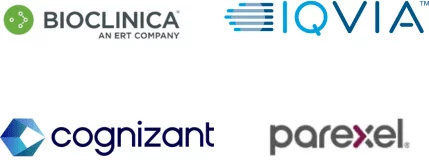
Want to attend the best medical coding program online?
Medical Coding Course in Online Curriculum Designed by Experts
Medical Coding Course
Introduction to Medical Coding
This module provides a foundational understanding of what medical coding is, it’s crucial role in the healthcare revenue cycle, and its significance for accurate billing, insurance claims, and health data analysis. It covers the history of coding, an overview of the different coding systems, and the ethical and legal aspects of medical coding, including compliance regulations like HIPAA.
Authorities and Certification Exams
Medical Terminology
Essential for understanding medical records, this module teaches the language of medicine. Students learn to decipher medical terms by breaking them down into prefixes, suffixes, root words, and combining forms, focusing on terms related to various body systems, diseases, procedures, and medications. This foundational knowledge is critical for accurately abstracting information from clinical documentation.
Medical Anatomy and Physiology (System-Wise Review)
This module provides a comprehensive review of the human body’s structure (anatomy) and how its systems function (physiology). It typically covers each body system (e.g., circulatory, respiratory, digestive, musculoskeletal, nervous) in detail, along with common diseases and conditions associated with them. A strong understanding of A&P is vital for coders to accurately assign codes based on the patient’s condition and the services rendered.
Medical Writing
While not universally a core module in all medical coding courses, some comprehensive programs may include a “Medical Writing” component. If present, it would focus on developing skills in clear, concise, and accurate documentation within a healthcare context. This might include understanding how to interpret and abstract information from medical records, the importance of detailed clinical notes for accurate coding, and potentially a brief overview of different types of medical documents. Note: A full “Medical Writing” course is a specialized field distinct from medical coding, often for those who write research papers, regulatory documents, etc.
ICD-10-CM Coding Guidelines and Code Sets
This module is dedicated to the International Classification of Diseases, 10th Revision, Clinical Modification (ICD-10-CM), which is used for coding diagnoses and inpatient procedures. Students learn the official guidelines for code assignment, including conventions, instructional notes, and chapter-specific rules, enabling them to select the most specific and accurate diagnosis codes from medical documentation.
CPT Coding
This module focuses on the Current Procedural Terminology (CPT) code set, used for reporting medical procedures and services performed by physicians and other healthcare providers. Students delve into the structure of the CPT manual, understanding the different sections (e.g., Evaluation and Management, Surgery, Radiology, Pathology and Laboratory, Medicine), and learning how to accurately assign codes based on the services documented.
Use of Modifiers
Modifiers are crucial for two-digit codes appended to CPT or HCPCS codes to provide additional information about a service or procedure, altering its meaning without changing the definition of the main code. This module teaches the appropriate application of various modifiers to reflect specific circumstances, such as multiple procedures, professional components, or unusual circumstances, ensuring correct reimbursement and compliance.
Errors in Medical Coding
This module highlights common mistakes and pitfalls in medical coding that can lead to claim denials, underpayment, overpayment, or even legal issues. It covers topics like unbundling, upcoding, downcoding, insufficient documentation, incorrect modifier usage, and failure to stay updated with coding guidelines. The emphasis is on identifying, preventing, and correcting these errors to ensure compliance and optimize the revenue cycle.
FREE Career Counselling
We are happy to help you 24/7
A Student’s Journey



Industry Ready Training
Accredited Courses
Get Placed
Industry Ready Training
Equip yourself with skills and knowledge required to be successful in the healthcare-pharma or healthcare-IT industry. Enhance your communication and personality.
Accredited Courses
Earn credentials through online or in-person programs validating the enhancement of your skills and expertise in the healthcare IT and pharma sectors.
Get Placed
Gain access to volunteer, internship, and placement opportunities and apply real-world applications in healthcare settings like hospitals, CROs, and pharma companies.
Level up your Career with Medical Coding Course in Bangalore.
Real people. Real results.
Master in-demand skills and knowledge
Propel your clinical research career with CliniLaunch

Unlock your potential Mentorship advantage
Personalized industry experts with career advice and support for your choices.

Navigate your medical career with confidence
Unlock your potential with upskilling in what you truly enjoy

Why Clini Launch?
Industry Driven Curriculum
- Adapt to industry standards
- Gain in-depth knowledge
- Up to date your skill sets
Experienced Instructors
- Interact with seasoned professionals
- Insightful healthcare practices
- Dedicated industry experts
Hands-on Learning
- Live interactive session
- Integrated case studies
- Practical step guidance
Industry Recognized Accreditations
- International Accreditation Organization (IAO)
- International Accreditation Forum (IAF)
- National Skill Development Council (NSDC)
Career Support Services
- Access to Career support group
- Resume Building Workshops
- Placement Mentorship Program
FAQs on Medical Coding Course in Bangalore
Medical Coding Course
The typical prerequisites for a Medical Coding Course in Bangalore usually involve a bachelor’s degree in a life science, medical, or allied health field, such as B.Pharm, M.Pharm, MBBS, BDS, BAMS, BHMS, BSc (Biotechnology, Microbiology, Biochemistry, Nursing), or similar. While some institutes may consider other graduates, a strong foundation in human anatomy, physiology, and medical terminology is often expected or provided as part of the initial curriculum.
The average duration of a medical coding course in Bangalore generally ranges from 2 to 6 months depending on the program you choose. Clini Launch offers two courses including Advanced Diploma in Medical Coding and Certification in Medical coding with a duration of 6 months and 3-4 months. It is typically designed to quickly equip students with industry-ready skills for the CPC certification exam.
A comprehensive curriculum for Medical Coding Course in Bangalore typically includes:
- Medical Terminology: Understanding prefixes, suffixes, and root words related to human anatomy and diseases.
- Anatomy & Physiology: In-depth knowledge of all human body systems.
- ICD-10-CM Coding: Diagnosis coding based on the International Classification of Diseases, 10th Revision, Clinical Modification.
- CPT (Current Procedural Terminology) Coding: Procedure coding for medical, surgical, and diagnostic services.
- HCPCS Level II Coding: Coding for services, equipment, and supplies not covered by CPT.
- Revenue Cycle Management (RCM): Overview of the entire billing process.
- HIPAA Training: Understanding patient privacy and data security regulations.
To assess the reputation and quality of a medical coding institute in Bangalore, you should look for:
- Accreditation and Affiliations: Check if they are affiliated with recognized bodies like AAPC (American Academy of Professional Coders) or AHIMA (American Health Information Management Association).
- Faculty Experience: Inquire about the instructors’ certifications (e.g., CPC, COC) and practical industry experience.
- Student Reviews and Testimonials: Look for feedback on platforms like Justdial or Google.
- Curriculum Alignment: Ensure the curriculum is up-to-date and aligns with international coding standards.
- Placement Success Stories: Ask for verifiable data on past student placements.
Leading Medical Coding Institutes in Bangalore typically provide comprehensive study materials and resources, including:
- Official Coding Manuals: Such as ICD-10-CM, CPT, and HCPCS Level II code books.
- Practice Exam Papers: Mock tests mirroring the format and difficulty of official certification exams (e.g., CPC).
- Workbooks and Handouts: With chapter-specific exercises and summaries.
- Access to Online Learning Platforms (LMS): For additional practice, quizzes, and recorded sessions.
- Case Studies: Real-world scenarios to practice coding skills.
Yes, Clini Launch – a medical coding institute in Bangalore offers free demo classes and counselling sessions. These are excellent opportunities for prospective students to:
- Understand the teaching methodology.
- Meet the instructors.
- Get an overview of the course’s content.
- Clarify any doubts regarding career prospects, fees, and eligibility before committing to the full program.
The fees for medical coding training in Bangalore can vary significantly based on the modules or the courses you choose from Clini Launch. We offer two courses for medical coding relevant to students: Advanced Diploma in Medical Coding, and Certification in Medical Coding. The course range may vary, and for this, you need to consult with your career counsellor for the same from Clini Launch.
Effective Medical Coding Training thoroughly prepares individuals for the CPC exam by:
- Covering the comprehensive syllabus required for the exam (Medical Terminology, Anatomy, ICD-10-CM, CPT, HCPCS Level II, Compliance, etc.).
- Providing extensive practice with mock tests and previous years’ questions.
- Offering expert guidance on exam strategies, time management, and open-book exam techniques.
- Conduct doubt-clearing sessions and personalized feedback.
Yes, beyond technical coding skills, Medical Coding Training often helps develop several crucial soft skills for career advancement:
- Attention to Detail: Essential for accurate code assignment and avoiding errors.
- Analytical Thinking: To interpret complex medical documentation and apply correct guidelines.
- Problem-Solving: For resolving coding discrepancies and challenging cases.
- Time Management: To efficiently handle a high volume of records and meet deadlines.
- Communication Skills: For clarifying documentation with healthcare providers (though coders typically don’t interact with patients or insurers).
The most widely recognized Healthcare Coding Certifications for medical coders in India, especially for those aiming for roles in the US healthcare outsourced market, are:
- CPC (Certified Professional Coder) from AAPC (American Academy of Professional Coders).
- COC (Certified Outpatient Coder) from AAPC.
- CIC (Certified Inpatient Coder) from AAPC.
- CCS (Certified Coding Specialist) and CCA (Certified Coding Associate) from AHIMA (American Health Information Management Association).
To maintain a Healthcare Coding Certification, professionals are typically required to complete continuing education units (CEUs) or continuing education credits (CECs) within a specific timeframe (e.g., 36 CEUs every two years for CPC). This ensures coders stay updated with constantly evolving coding guidelines, regulations, and industry changes. These units can be earned through workshops, webinars, conferences, and approved online courses.
Obtaining a Healthcare coding certification significantly impacts salary prospects in India. Certified coders are generally paid 20-30% more than non-certified coders. Entry-level certified coders in Bangalore can expect an average starting salary of INR 2.5 LPA to 4.5 LPS, with experienced certified professionals earning much higher, sometimes upwards of INR 6-12 LPA, depending on their specialization and experience.
Ethical considerations in Medical Coding are paramount. They primarily revolve around:
- Accuracy and Honesty: Coders must assign codes that accurately reflect the services rendered and the patient’s condition, avoiding upcoding (billing for a more complex service than performed) or down coding (billing for a less complex service than performed) for financial gain.
- Confidentiality (HIPAA Compliance): Protecting patient health information (PHI) as mandated by HIPAA.
- Compliance with Regulations: Adhering strictly to official coding guidelines and healthcare regulations to prevent fraud and abuse. These ethical practices ensure fair reimbursement and maintain the integrity of healthcare data.
Ethical considerations in Medical Coding are paramount. They primarily revolve around:
- Accuracy and Honesty: Coders must assign codes that accurately reflect the services rendered and the patient’s condition, avoiding upcoding (billing for a more complex service than performed) or down coding (billing for a less complex service than performed) for financial gain.
- Confidentiality (HIPAA Compliance): Protecting patient health information (PHI) as mandated by HIPAA.
- Compliance with Regulations: Adhering strictly to official coding guidelines and healthcare regulations to prevent fraud and abuse. These ethical practices ensure fair reimbursement and maintain the integrity of healthcare data.
In medical coding:
- ICD-10-CM (International Classification of Diseases, 10th Revision, Clinical Modification) codes are used to report diagnoses, signs, symptoms, and causes of injury or disease. They are alphanumeric codes and provide high specificity for medical conditions.
- CPT (Current Procedural Terminology) codes are used to report medical, surgical, and diagnostic procedures performed by healthcare providers. They are typically five-digit numeric codes and describe the services rendered.
Medical Coding Specialist training heavily emphasizes practical skills such as:
- Medical Record Analysis: The ability to thoroughly read and abstract relevant information from patient charts, physician notes, and lab reports.
- Code Application: Accurately assign ICD-10-CM, CPT, and HCPCS Level II codes based on documentation and official guidelines.
- Querying Physicians: Formulating clear and concise queries to healthcare providers when documentation is ambiguous or insufficient.
- Using Coding Software/Tools: Familiarity with various coding encoders and electronic health record (EHR) systems.
- Compliance Checks: Ensuring codes meet regulatory and payer requirements.
Yes, most comprehensive medical coding specialist training programs include modules on Revenue Cycle Management (RCM). This is crucial because medical coding is an integral part of the revenue cycle management process. Students learn how accurate coding directly impacts billing, claims submission, insurance reimbursement, and ultimately, the financial health of healthcare providers.
Opting for specialized medical coding specialist training provides several advantages over a general billing and coding course:
- Deeper Expertise: Focuses extensively on the intricacies of coding guidelines, nuances of specific codes, and complex coding scenarios.
- Higher Earning Potential: Specialized coders (e.g., in a particular medical specialty or inpatient coding) often command higher salaries.
- Stronger Certification Prep: Tailors the curriculum specifically for high-level coding certifications (like CPC, COC, CIC, CCS), which are often valued by employers.
- Faster Career Progression: Equips individuals with the advanced skills needed to move into roles like Coding Auditor, Educator, or Manager.
When choosing a Billing and Coding Online course, key considerations for quality and recognition include:
- Accreditation: Ensure the course provider or the certification it prepares you for is accredited by reputable bodies like AAPC or AHIMA.
- Instructor Credentials: Verify that instructors are certified coders with practical experience.
- Comprehensive Curriculum: Look for coverage of ICD-10-CM, CPT, HCPCS Level II, medical terminology, anatomy, RCM, and compliance.
- Interactive Learning: Check for features like live online sessions, discussion forums, and practical coding exercises.
- Technical Support: Availability of support for online platforms and resources.
For a billing and coding online course, typical technical requirements include:
- Reliable Internet Connection: For streaming lectures, accessing resources, and participating in online sessions.
- Desktop or Laptop Computer: With sufficient processing power and memory.
- Webcam and Microphone: For interactive classes and discussions.
- Updated Web Browser: Compatible with the Learning Management System (LMS).
- PDF Reader: For accessing digital study materials.
While actual coding software may not be required for home setup, familiarity with general office productivity software (e.g., MS Office) is often helpful.
After completing a Medical Coding Course, typical career paths include:
- Medical Coder/Outpatient Coder: Translating physician documentation into codes for billing.
- Inpatient Coder: Specializing in hospital inpatient records.
- Coding Auditor: Ensuring accuracy and compliance with coded medical records.
- Compliance Officer: Focusing on regulatory adherence in coding and billing.
- Coding Educator: Training new coders or healthcare staff.
- Remote Coder: Working from home for various healthcare organizations.
A good Medical Coding Course addresses the constant updates in coding guidelines and regulations by:
- Using the Latest Code Books: Ensuring students are trained with the current ICD-10-CM, CPT, and HCPCS Level II manuals.
- Incorporating Annual Updates: Curriculum is typically reviewed and updated to reflect changes released by official bodies like CMS, NCHS, and AMA.
- Emphasizing Official Guidelines: Teaching students to rely on official coding guidelines (e.g., ICD-10-CM Official Guidelines for Coding and Reporting) rather than relying solely on memory.
- Encouraging Continuing Education: Highlighting the importance of ongoing learning and certifications to stay current.
While a medical background is advantageous, pursuing a Medical Coding Course can still be beneficial for individuals with a non-medical background, offering:
- Entry into the Healthcare Industry: Provides a pathway into a stable and growing sector without requiring clinical roles.
- Specialized Skillset: Equips them with highly sought-after technical skills.
- Opportunity for Growth: With dedication, non-medical background individuals can excel and advance in coding roles.
- Structured Learning: Courses provide the necessary foundational knowledge in medical terminology and anatomy.
Pursuing a medical coding course in online mode offers several advantages:
- Flexibility: Study at your own pace and schedule, ideal for working professionals or those with other commitments.
- Accessibility: Learn from anywhere, removing geographical barriers to quality education.
- Cost-Effectiveness: Often, online courses can be more affordable due to lower overheads, and they save on commuting expenses.
- Self-Paced Learning: Allows individuals to spend more time on challenging topics or less time on familiar ones.
- Access to Diverse Instructors: Opportunity to learn from experts across different regions.
Pursuing a medical coding course in online mode offers several advantages:
- Flexibility: Study at your own pace and schedule, ideal for working professionals or those with other commitments.
- Accessibility: Learn from anywhere, removing geographical barriers to quality education.
- Cost-Effectiveness: Often, online courses can be more affordable due to lower overheads, and they save on commuting expenses.
- Self-Paced Learning: Allows individuals to spend more time on challenging topics or less time on familiar ones.
- Access to Diverse Instructors: Opportunity to learn from experts across different regions.
Online Medical coding courses in online mode provide support and interaction through:
- Live Online Classes: Scheduled sessions with instructors for real-time teaching and Q&A.
- Discussion Forums/Community Platforms: For peer-to-peer interaction and instructor support.
- Email and Chat Support: Direct communication channels with instructors or academic advisors.
- Regular Feedback: On assignments, mock tests, and practice exercises.
- Recorded Sessions: For reviewing lectures at your convenience.
Common challenges in a medical coding course in online mode include:
- Lack of Self-Discipline: Requiring strong self-motivation to stay on track. This is addressed by structured modules, deadlines, and regular assessments.
- Technical Issues: Internet connectivity or software problems. Institutes usually offer technical support.
- Limited Direct Interaction: Less face-to-face interaction than traditional classrooms. This is mitigated by live Q&A sessions, dedicated doubt-clearing sessions, and active online forums.
- Information Overload: Due to the vast amount of medical and coding knowledge. Good courses break down content into manageable modules and provide clear learning paths.
The typical admission process for a medical coding training institute in Bangalore often involves:
- Enquiry/Application: Filling out an online or offline inquiry/application form.
- Counseling Session: A meeting with an admissions counselor to discuss course details, career prospects, and eligibility.
- Eligibility Check: Verification of academic qualifications (e.g., bachelor’s degree in a relevant field).
- Registration/Enrollment: Completing the formal registration process and paying the initial fees or booking amount.
- Batch Allotment: Assignment to a suitable batch based on schedule preferences.
Clini Launch – a medical coding training institute in Bangalore ensure industry relevance by:
- Regular Curriculum Updates: Incorporating the latest changes in coding guidelines (ICD-10-CM, CPT, HCPCS Level II) and healthcare regulations.
- Industry Expert Faculty: Employing instructors who are certified coders with current practical experience in the healthcare industry.
- Industry Partnerships: Collaborating with CROs, hospitals, and medical billing companies for insights and placement opportunities.
- Feedback from Alumni and Employers: Incorporating feedback to refine course content and training methodologies.
Beyond direct placement assistance, medical coding training institutes in Bangalore often offer additional career support services such as:
- Resume Building Workshops: Guiding students on creating professional resumes tailored for medical coding roles.
- Mock Interview Sessions: Preparing students for job interviews through simulated scenarios and feedback.
- Soft Skills Development: Training in communication, professional etiquette, and workplace readiness.
- Industry Seminars/Webinars: Providing opportunities to network with industry professionals and learn about current trends.
- Continuing Education Guidance: Advising on maintaining certifications and pursuing further specializations.
The validity and recognition of a medical coding certification online are ensured primarily by the certifying body, not solely by the online format. Certifications from globally recognized organizations like AAPC (e.g., CPC, COC) and AHIMA (e.g., CCS, CCA) are highly respected, regardless of whether the preparation course was online or in-person. The key is to pass the rigorous, standardized exam administered by these bodies.
For taking a medical coding certification online exam (if offered in an online proctored format), candidates typically need:
- A reliable computer (desktop or laptop) with a stable internet connection.
- A functioning webcam and microphone for remote proctoring.
- Specific browser requirements or a secure browser application provided by the testing platform.
- A quiet, private environment free from distractions.
- Official coding manuals (physical books, often open-book exams). It’s crucial to check the specific technical requirements of the certifying body (e.g., AAPC) well in advance of the exam.
After completing a training course, the medical coding certification online process typically involves:
- Application: Registering for the certification exam through the certifying body’s website (e.g., AAPC).
- Scheduling: Choosing an exam date and a proctoring method (online proctored or in-person at a testing center).
- Payment: Paying the exam fee
- Exam Preparation: Continuing self-study and practice tests.
- Taking the Exam: Sitting the exam under strict proctoring conditions.
- Results and Credentialing: Receiving results and, upon passing, earning the certification and the corresponding credential.
The typical class sizes and instructor-to-student ratios for “Medical coding classes online” can vary.
- Live Online Classes: May have smaller sizes (e.g., 15-30 students) to facilitate more direct interaction and personalized attention from the instructor.
- Self-Paced Courses: Often have an unlimited number of students with support provided through forums or scheduled Q&A sessions, leading to a higher student-to-instructor ratio but potentially more individual interaction. It’s advisable to inquire about class sizes and support mechanisms when evaluating online programs.
Medical coding classes online handle doubt-clearing and personalized feedback through various channels:
- Dedicated Q&A sessions: Schedule live sessions specifically for addressing student questions.
- Online Forums/Discussion Boards: Where students can post queries and receive responses from instructors or peers.
- Email/Chat Support: Direct Communication channels with instructors or teaching assistants.
- Feedback on Assignments: Detailed comments and explanations on graded coding exercises and mock tests.
- One-on-One Mentoring (optional): Some premium online courses may offer limited one-on-one sessions.
For students enrolled in medical coding classes online, typical technical support includes:
- Helpdesk/Support Team: For issues related to accessing the learning platform, course materials, or virtual labs.
- Email and Phone Support: Direct contact methods for technical assistance.
- Troubleshooting Guides/FAQs: Online resources to resolve common technical problems.
- IT Support: For any software or system requirements related to the course. This ensures a smooth learning experience without disruptions due to technical glitches.
Companies in Bangalore that typically hire medical coding graduates through placement drives include:
- Large multinational CROs (Contract Research Organizations) with healthcare services divisions (e.g., IQVIA, ICON, Syneos Health).
- Healthcare IT and BPO firms specializing in RCM services (e.g., Omega Healthcare, Vee Technologies, Access Healthcare).
- Revenue Cycle Management (RCM) companies directly serving US healthcare providers.
- Medical transcription companies are expanding into coding services.
- Some smaller, specialized healthcare service providers.
The success rate of medical coding training and placement in Bangalore program at Clini Launch differs as it is based on the student’s ability to convince the employers. However, we offer 100% placement assistance including mentorship programs, resume building, networking opportunities, and other benefits through VAS (Value Added Services). However, students should verify these claims by:
- Asking for specific placement records from previous batches.
- Checking alumni testimonials and connections on professional platforms like LinkedIn.
- Understanding the nature of placement assistance (e.g., job referrals, interview preparation vs. guaranteed jobs). The job market for medical coders in Bangalore is generally strong, which contributes to higher success rates for well-trained individuals.
The time it typically takes to secure a job after completing medical coding training and placement in Bangalore can vary. For more fresh graduates, it might range from 1 to 3 months after completing the course and obtaining certification. Factors influencing this timeline include individual performance in interviews, specific industry demand at the time, and the effectiveness of the institute’s placement cell.
Medical coding for beginners programs always start with foundational concepts, including:
- Basic Medical Terminology: Common prefixes, suffixes, and root words.
- Introduction to Human Anatomy and Physiology: A simplified overview of body systems relevant to coding.
- Overview of the US Healthcare System: Understanding its structure, payers, and providers.
- Introduction to ICD-10-CM, CPT, and HCPCS Level II: The purpose and basic structure of each coding system.
- HIPAA Basics: Principles of patient privacy and confidentiality. These modules are crucial for building a strong base before delving into complex coding rules.
Yes, there are several free resources and introductory course for medical coding for beginners to gauge interest:
- YouTube Channels: Many certified coders and institutes offer free video tutorials (e.g., AAPC’s channel, Contempo Coding).
- AAPC Free Resources: AAPC’s website offers free webinars, articles, and basic coding tools.
- WHO ICD-10 Training: The World Health Organization provides free online modules on ICD-10.
- CMS Medicare Learning Network (MLN): Offers free educational modules on Medicare coding and billing.
- Basic Medical Terminology Apps/Websites: To learn foundational vocabulary.
For medical coding for beginners after initial training, career support can include:
- Entry-level job placement assistance: From the training institute.
- Resume and cover letter guidance.
- Interview preparation: Mock interviews and tips.
- Networking events: To connect with potential employers and other coders.
- Guidance on professional certification: Encouraging them to pursue and pass the CPC or CCA exam, which is often crucial for entry-level roles.
Medical Coder Certificate Programs ensure industry readiness by:
- Curriculum Alignment: Designing coursework directly aligned with the knowledge required for industry-recognized certifications (AAPC, AHIMA).
- Practical Application: Emphasizing hands-on coding exercises, case studies, and sometimes simulations.
- Experienced Faculty: Employing instructors who are certified and have real-world coding experience.
- Focus on Compliance: Thoroughly covering regulatory guidelines and ethical coding practices.
- Industry Engagement: Often inviting guest speakers from the field or having industry advisors for curriculum development.
Pursuing a medical coder certificate program offers distinct benefits over self-study:
- Structured Curriculum: Provides a clear learning path and ensures comprehensive coverage of all necessary topics.
- Expert Instruction: Access to experienced instructors who can clarify complex concepts and provide real-world industry insights.
- Dedicated Support: Availability of doubt-clearing sessions, feedback on practice and academic guidance.
- Peer Learning: Opportunities to interact with fellow students, fostering collaborative learning.
- Placement Assistance: Clini Launch offers 100% placement assistance in finding job opportunities.
- Higher Pass Rates: Structured programs often led to better success rates on certification exams.
Certified medical coder online course providers ensure quality virtual instruction through:
- Certified and Experienced Online Instructors: Teachers who are proficient in both medical coding and effective online pedagogy.
- High-Quality Digital Content: Engaging video lectures, interactive modules, and comprehensive e-books.
- Structured Learning Platforms: User-friendly Learning Management Systems (LMS) with clear navigation and progress tracking.
- Regular Assessments and Feedback: Online quizzes, assignments, and mock exams with detailed feedback.
- Technical Support: Dedicated teams to assist with any platform or software issues.
For students struggling in a certified medical coder online course support systems often include:
- Dedicated Q&A Forums: Where students can post questions and receive responses from instructors or teaching assistants.
- Scheduled Doubt-Clearing Sessions: Live online sessions specifically for addressing student queries.
- Email or Chat Support: Direct communication with instructors for personalized help.
- Supplementary Resources: Additional readings, video tutorials, or practice exercises for challenging topics.
- Progress Tracking and Alerts: Systems that identify students who might be falling behind and trigger outreach from academic advisors.
A foundational certified medical coder online course for CPC will cover all major areas of coding including surgical, E/M (Evaluation and Management), radiology, pathology, and medicine. However, Clini Launch also offer:
- Advanced/Specialty Courses: delve deeper into specific medical specialties (e.g., Cardiology Coding, Orthopedic Coding).
- Bundled Programs: Where the core CPC preparation is combined with a specialty certification prep (e.g., COC for outpatient coding, CIC for inpatient coding). It’s important to check if the course prepares you for general certification or includes specialized training.
Clini Launch recent placed students

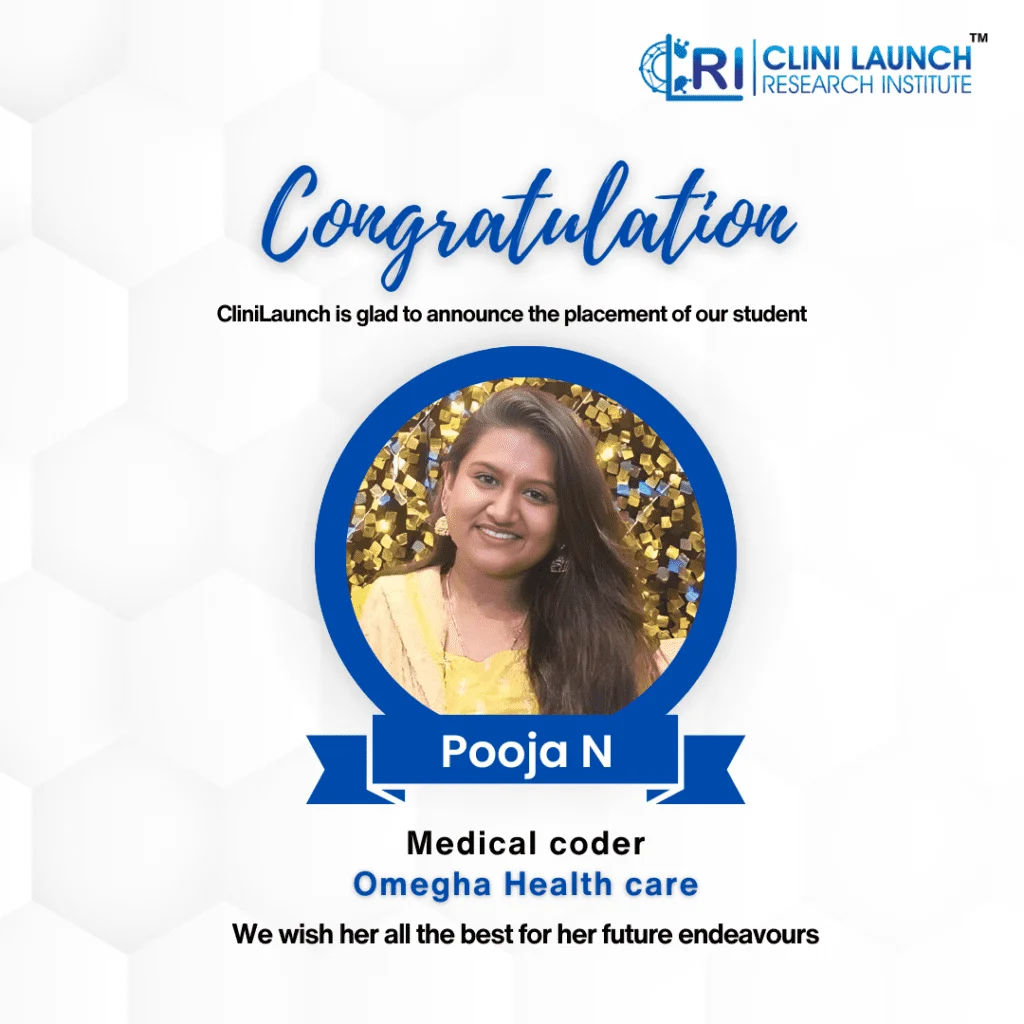


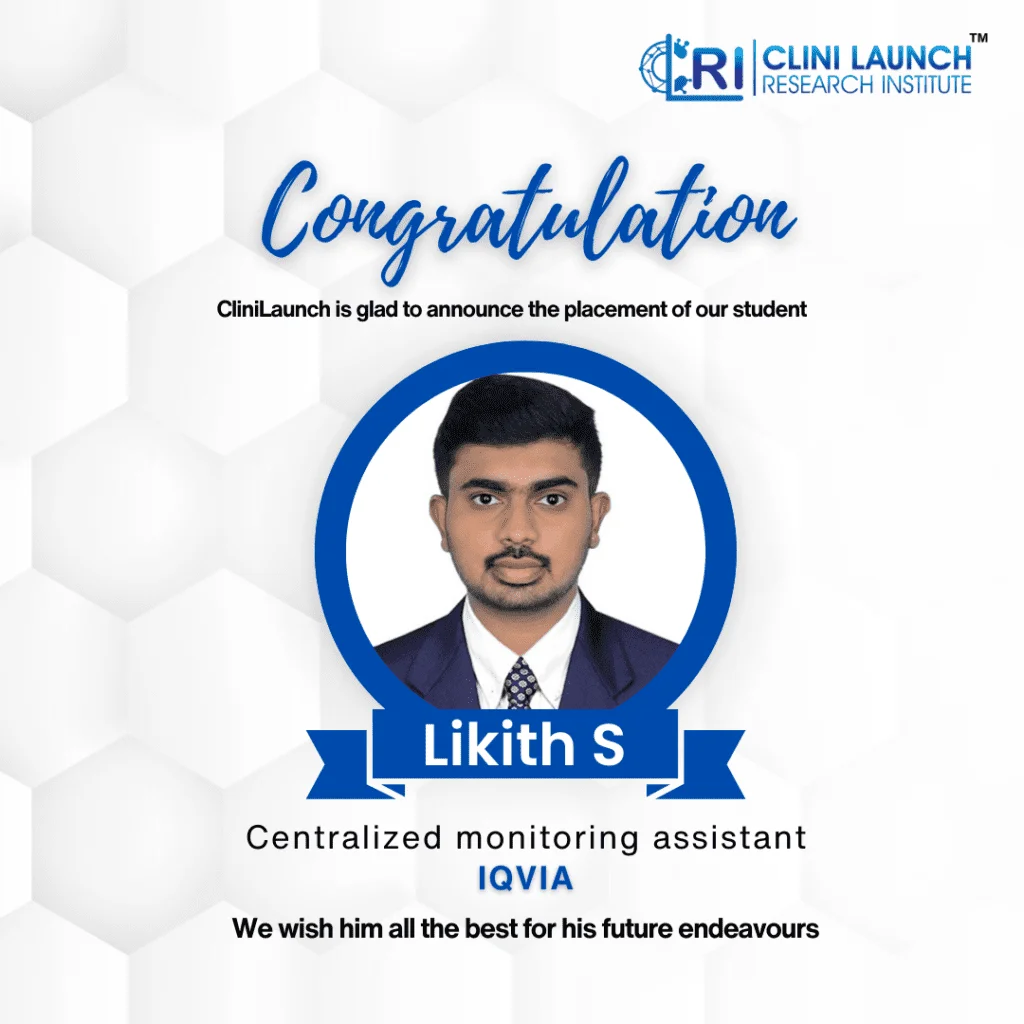


Testimonials
Upskilling does make a difference. Graduates speak out. Hear what our students and professionals are saying about their upskilling journey with Clini Launch.

